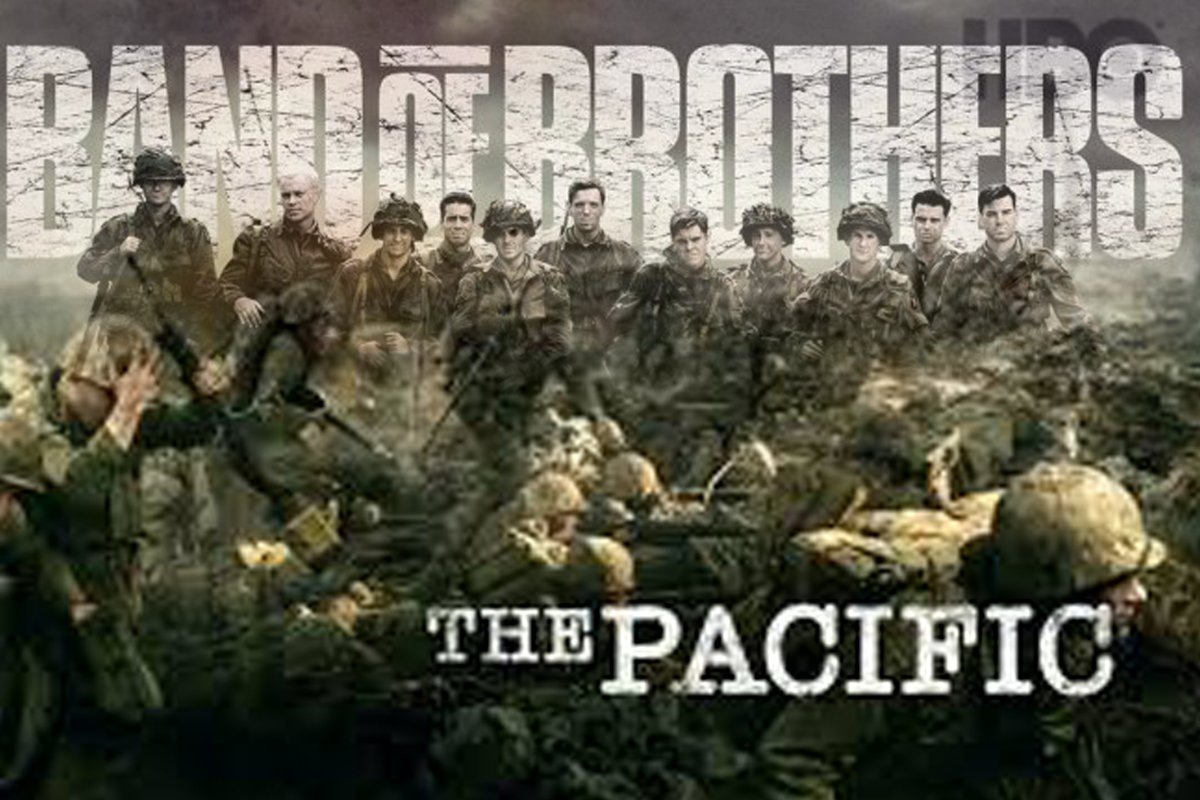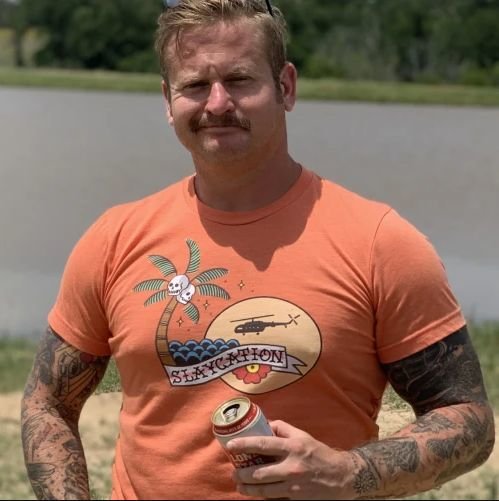‘Band of Brothers’ vs ‘The Pacific’: Which is the Greatest Military Series of All Time?

There are just some things that are unlikely to ever be settled. Arguing certain topics — like the beauty of a sunset versus a sunrise, or a mother choosing her favorite child (to the world, not in her own head) — is an attempt to chop down one amazing thing to boost the status of another. The truth is that these answers are more often than not formed in the context of each individual’s experience.
“Band of Brothers” and “The Pacific.” Two of the greatest, most iconic military series to ever grace the screen. These HBO dramas tell the stories of our greatest generation’s fight in the European and Pacific theaters during World War II. Contrarians may debate it, but to those of us who accept truths like Earth being round and America being the greatest country in the world, there is no question that these series are without peer.
Is one better than the other? Even though I was in the U.S. Army and was Airborne and would really love to hate all things U.S. Marine Corps — I can’t possibly pick a favorite. But there are important differences in these series if you’re going to attempt crowning one as better than the other.
The first thing to keep in mind when comparing these two series is the advantages each had from a filmmaking perspective. On the one hand, “Band of Brothers” was released in 2001, a full nine years before “The Pacific,” so it had the unfortunate advantage of having way more surviving veterans from the story to interview. Adding these previously unwritten anecdotes and other small details made for a more personal accounting of events. On the other hand, the producers who made “The Pacific” were able to fix all of the self-perceived mistakes they’d made in the production of “Band of Brothers.”
The other consideration is the intellectual property on which these stories are based. “Band of Brothers” is based on the book of the same name by Stephen Ambrose. It was written by him based on archives and interviews with the surviving members of Easy Company, 501st of the 101st Airborne almost 50 years after the war. And while he was able to glean fountains of information in his research and from the men, it took on a friendlier, more sterile tone than Eugene Sledge’s “With the Old Breed” and Robert Leckie’s “Helmet For My Pillow,” on which “The Pacific” was based.
Sledge and Leckie wrote their own books relatively soon after they came home from the war, and the tone is more savage and raw. The perspective is the grunt’s personal point of view as opposed to a professional author’s interpretation of events based on research and interviews. This is, in my opinion, very apparent when you watch the two side by side.
While the danger of combat is felt vividly in “Band of Brothers,” the raw dirtiness of combat isn’t shown through the same lens. The exception is in the closing episodes when Easy Company discovers the horrors of concentration camps and shows our soldiers being judge, jury, and executioner to suspected SS members. Those scenes pale, however, to the savagery felt at the individual human level in “The Pacific.” This can also be attributed to the nature of the enemies — both manmade and from Mother Nature — we faced in the two major theaters of World War II. If anything, this difference could be less about the filmmaking and more about the real-life events.

On the performance side of the house, the characters are the foundation. And since these characters are real people, we can liken the strength of each character to the quality of the casting. A few actors absolutely nailed their role due to both the striking physical similarities to the real person they were portraying and the strength of their performance. The first of these is Frank John Hughes as “Wild Bill” Guarnere in “Band of Brothers” — not only is the resemblance uncanny, but the accent and performance was by far, in my opinion, the best meeting of the two across either series.
The second best casting in the two worlds can only be judged in photographs and the written reactions to his character by those who knew him because the real veteran wasn’t alive to participate in interviews: Rami Malek as Corporal Merriel “Snafu” Shelton in “The Pacific.” His strange but endearing mannerisms are nailed in a subtle way throughout the series, along with a spot-on northern Louisiana Cajun accent. It’s no surprise that Malek went on to win an Academy Award for his transformative role as Freddy Mercury in “Bohemian Rhapsody.”

Characters should also inspire the hidden courage and potential we all possess by showing how “average” people can accomplish extraordinary things in impossible situations. Both “The Pacific” and “Band of Brothers” do this. Outnumbered paratroopers enduring endless shelling in sub-freezing temperatures and without winter clothing. Marines trudging through sweltering jungles through monsoons, malaria, and a suicidal enemy. In both cases, these journeys are only possible through the inspiring leadership of the NCOs.
For the men of Easy Company, it came in the form of First Sergeant Carwood Lipton, whose maturity and calm under fire during the Battle of the Bulge, in the midst of being commanded by an incompetent CO, was portrayed amazingly well by Donnie Wahlberg. In “The Pacific,” NCO leadership was embodied by Gunnery Sergeant John Basilone. After earning the Medal of Honor on Guadalcanal, Basilone refused a life of luxury selling war bonds stateside and instead took on the duties of training Marines for combat. Then, after getting married and having an opportunity to live his life in peace, he volunteered to lead his men into battle, where he was killed during the invasion of Iwo Jima.

In regard to filmmaking intangibles: cinematography, sound, and editing are just a few categories that Hollywood deems important enough by which to rate and award film and television. And while they’re important, comparing those components in these two series would be similar to the other categories previously discussed — largely subjective. Do you prefer the amazing mass tac combat jumps depicted throughout “Band of Brothers” or the wide, panoramic shots of Marine amphibious landings? The look of the cold and blue Hürtgen Forest or the dark and wet jungle floor of Peleliu? Do you prefer the nonstop combat action and continuous macro portrayals of battle, or do you like seeing the mundane details of the individual? Again, these are up to mood and taste to decide.
From a storytelling perspective, the stark differences between “Band of Brothers” and “The Pacific” are found in the front and back ends of each. “Band of Brothers” does an amazing job of showing bonds forge between the men of Easy Company as they endure months of training in preparation for the invasion of Nazi-occupied France. We are taken back to the formation of the unit and shown everything that went into training and preparing them for the trials that lay in store — and just how hard of a road it was just to arrive in hell. We travel with them on their journey, and then, right alongside them, we’re hit with an abrupt end to the experience. The company is separated at the end of the war, and the men go their separate ways to pursue life as civilians.

In “The Pacific,” instead of seeing them train and prepare for their island hopping campaign, we meet our characters in their baptism by fire. But we are able to go home with them and experience how the horrors of war aren’t left on the battlefield. We get to see them interact with their friends and families and struggle to find their place. In their struggle, once again, they show us how amazing this generation was and how much potential lies within us all.
Whether it’s a kid from Philly jumping from a perfectly good aircraft over Georgia or a combat-hardened Marine trying to get through college enrollment, we see through them that we are all humans and that our struggles are our own. We can learn from these men, and from these series, that the strength to defeat any empire and accomplish the impossible lies in all of us. And that is what makes them both the greatest of all time.

Jariko Denman is a contributing writer for Coffee or Die. He is a retired US Army Ranger and deployed to combat 15 times in Iraq and Afghanistan from 2002 to 2012, amounting to 54 months of total combat experience as part of a Joint Special Operations Task Force. He now lives in Los Angeles and has advised on several major motion pictures, national ad campaigns, and television series as well as continuing to train and work within government and tactical industries.
BRCC and Bad Moon Print Press team up for an exclusive, limited-edition T-shirt design!
BRCC partners with Team Room Design for an exclusive T-shirt release!
Thirty Seconds Out has partnered with BRCC for an exclusive shirt design invoking the God of Winter.
Lucas O'Hara of Grizzly Forge has teamed up with BRCC for a badass, exclusive Shirt Club T-shirt design featuring his most popular knife and tiomahawk.
Coffee or Die sits down with one of the graphic designers behind Black Rifle Coffee's signature look and vibe.
Biden will award the Medal of Honor to a Vietnam War Army helicopter pilot who risked his life to save a reconnaissance team from almost certain death.
Ever wonder how much Jack Mandaville would f*ck sh*t up if he went back in time? The American Revolution didn't even see him coming.
A nearly 200-year-old West Point time capsule that at first appeared to yield little more than dust contains hidden treasure, the US Military Academy said.












